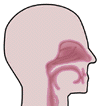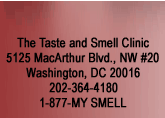  |
||
 |
It is common for physicians to be uninformed about taste and smell disorders. It is not uncommon for some physicians to consider problems of taste and smell trivial and their treatment cosmetic. It is not uncommon for educated physicians to consider disorders of taste and smell as monolithic symptoms which simply require one drug or one surgical procedure to correct them. It is common for a physician to call me on the telephone to ask “What drug should I give my patient to restore smell function to normal.” I often respond with a question “If a patient came to you complaining of severe abdominal pain would you call another physician requesting treatment advice or would you initiate your medical/surgical expertise to establish a diagnosis and provide evidence-based therapy?” These scenarios highlight the dilemma surrounding physicians’ responses to patient complaints of loss and distortion of taste and smell. Because of this lack of familiarity physicians have used many strategies they consider beneficial to evaluate and to treat patients complaining of these problems; however, these strategies have usually been unsuccessful in helping these patients for two major reasons: (1) physicians do not understand the clinical and biochemical factors which caused the dysfunction and (2) physicians’ lack of appropriate etiological knowledge make treatment of patients unsuccessful, and in some cases, detrimental. I wish to detail some of the errors related to the most significant clinical problems we evaluate and treat at The Taste and Smell Clinic, Washington, DC. Unpleasant Taste Sensations in the Absence of Food or Drink — Phantaguesia This symptom is the most compelling one forcing patients to seek medical assistance. Dentists are commonly consulted and confronted with this symptom after performance of some dental procedure; they usually see no oral lesions to account for them. To treat this symptom dentists have occasionally replaced most, if not all, the patient’s dental fillings. This uniformly fails to help. Dentists have also occasionally removed some, if not all, the patient’s teeth to correct this symptom. This also fails to help. Physicians presented with this symptom are also usually confused and perplexed. This is because there are usually no pathological lesions in the oral cavity to account for the symptom. Since most patients are usually anxious or depressed by the presence of the symptom, physicians may use anxiolytics or antidepressants to alleviate the symptom. While these drugs may relieve the anxiety and depression associated with this problem they do not deal with the underlying symptom. Because physicians are confused by this symptom they may (1) discourage the patient from expressing it, (2) send the patient to a psychiatrist recognizing their inability to treat the patient’s anxiety or depression, or (3) send the patient to a neurologist considering the symptom a manifestation of some central nervous system dysfunction (e.g., brain tumor, dementia, seizure disorder, etc.). These referrals are not helpful since the medical treatment given is usually not helpful. Patients themselves may try acupuncture, hypnosis, chiropracty or homeopathy, none of which helps to relieve the symptom. Some have used herbal preparations, Vedic massage, yoga, meditation, or other “modern age” therapies to relieve these symptoms, usually without relief. Burning Mouth Syndrome — Oropyrosis This symptom is most commonly experienced by post menopausal women appearing either spontaneously or after a dental procedure. This symptom is commonly associated with a metallic or salty phantageusia. Dentists usually find no oral lesion responsible for this symptom. Dentists may replace some or all fillings in the teeth considering the symptom a type of “metallic” interaction between saliva and the filling material; this fails to correct the symptom. Some dentists may consider mercury dental fillings as the cause of this symptom and replace these fillings with some inert material; this therapy also fails to correct the symptom. Dentists may also extract some or all the teeth to eliminate the symptom; this fails to correct the symptom. Patients are then left without any alternative to correct the problem. Physicians commonly deal with this problem in the same manner that they deal with phantageusia as discussed above (vs). Some physicians mistake the oral burning as a manifestation of gastrointestinal reflux disease (GERD) and treat the patient with antacids, proton pump inhibitors or other medications, usually without relief of the oral burning. Patients have resorted to measures similar to those already noted for treatment of taste distortions – acupuncture, hypnosis, chiropracty, and homeopathy – without success. Unpleasant Smell Sensations in the Absence of Any Environmental Odor — Phantosmia This symptom usually occurs following a loss of smell or, on occasion, spontaneously. This symptom is another primary force which drive patients to the physician to seek relief. This symptom is usually associated with normal appearance of the upper airways and without any nasal or sinus disease which can confuse the physician since no anatomical diagnosis is apparent. For diagnosis, most concerned physicians will perform a nasal endoscopy which is usually normal; nevertheless, physicians may treat the patient with a course of antibiotics and/or nasal steroids – uniformly without symptom relief. For further diagnosis physicians may perform a CT scan of the sinsuses or MRI of the brain to rule out a local lesion or a brain tumor or other CNS lesions. While this pathology is possible it is usually unlikely in these patients unless there are other, accompanying symptoms. In addition, these procedures are costly along with usual lack of discovered pathology. This symptom usually starts a panoply of referrals from local medical doctors and otolaryngologists, to neurologists, allergists, or to whomever, to try to understand the symptom and to initiate therapy. Some patients are treated with antiepileptic drugs since the symptom may be considered a hallucination or associated with a seizure disorder, particularly if the symptom is intermittent. Some physicians recognize the depression and anxiety associated with this symptom and treat these symptoms as would a psychiatrist with antidepressants or anxiolytics – usually without success in alleviating the underlying symptom. If this problem becomes chronic some surgeons have performed a craniotomy and severed the olfactory nerves to inhibit the symptom. These drugs and surgical procedures have had limited success in alleviating this symptom; however, they can and do initiate severe additional clinical problems, including loss of smell if cranial nerves are severed. Loss of Taste — Hypogeusia This symptom is one of the most confusing with which patients present to physicians. Many patients who complain of taste loss state that their smell function is normal. However, by and large, patients with taste loss are really reporting loss of food flavor which relates primarily to loss of smell function. Physicians who deal with this symptom, however, usually consider it at face value. After a careful examination of the oral cavity which usually reveals no pathology, physicians are usually at a loss as to either diagnosis or treatment. Physicians have little ability to test taste function in any systematic manner. Some physicians, with some knowledge of physiology, may prescribe a variety of vitamins, trace metals, including zinc and/or magnesium; others may use substances such as alpha-lipoic acid. In general, without a clinical, biochemical, evidence-based foundation upon which to establish a diagnosis, these therapies fail to produce beneficial effects except those associated with what may be considered placebo-responses. In the face of these errors of evidenced based diagnosis the lack of efficacious treatment is understandable. Patients, out of desperation, resort to a variety of alternative treatments as noted above. They may turn to hypnosis, acupuncture, homeopathy, herbal preparations and a variety of other “modern age” therapies; these latter therapies commonly appear in various lay-based “health” publications. These alternative medical therapies are usually unsuccessful in helping patients recover their function. Loss of Smell — Hyposmia This symptom is another major complaint which drives patients to seek medical help. Loss of smell may be associated with seasonal allergies, asthma related to season or exercise, acute or chronic sinusitis or what some people call “post nasal drip.” Since patients associate these symptoms with loss of smell it is usual for patients to seek out an otolaryngologist to evaluate this complaint and treat the symptom. Otolaryngologists are surgeons with a commitment to correct visible lesions in the upper airways not to deal with issues of sensory dysfunction. Their knowledge of biochemistry and detailed anatomy of the olfactory system is usually minimal. Most, understandably, attempt to relate the smell loss to patient symptoms and to pathological anatomy of the upper airways. Diagnosis may include nasal endoscopy, CT scan of sinsuses, and MRI of brain; these anatomical diagnostic techniques usually reveal no pathology related to the smell loss. Physicians have little knowledge of how to test smell function and whatever is available is of little practical value. Many otolaryngologists, finding a deviated septum or manifestation of sinus disease, assume these changes are likely causes of the smell loss whether or not this is the case. If smell loss is associated with impaired nasal breathing, nasal polyposis, sinusitis or allergic symptomology, physicians usually recommend antibiotics, then nasal steroids. If unsuccessful, they may refer the patient to an allergist for treatment. If these therapies fail, they may perform surgical procedures to straighten the nasal septum, remove the nasal polyps or “correct the sinuses.” While these procedures may be useful to improve nasal breathing or decrease local nasal or sinus disease they usually do not deal with the underlying problem of smell loss. They usually do more harm than good since these surgical procedures have been reported by otolaryngologists to induce smell loss. Otolaryngologists and other physicians have also used oral or systemic adrenal corticosteroids to correct smell loss regardless of cause of the loss. In some patients with allergic rhinitis this may be initially successful to restore smell function; however, this effect is uniformly transient and “wears off” after a few days or weeks. Repeat attempts at this treatment are usually unsuccessful due to receptor tachyphylaxis (receptor resistance) which leaves both patient and physician at a loss at what to do next. Neurologists and neurosurgeons treating patients with head injuries and loss of smell commonly tell patients that they have “severed their olfactory nerves” and that “they will never smell again.” This is devastating news to most patients who feel there is no hope for them to regain sensory function. While neural severing does occur in a very few patients following head trauma most are anatomically intact. After an appropriate evaluation, treatment can and has been successful in restoring smell function in many of these patients. Physicians other than otolaryngologists have tried therapies similar to those used to correct hypogeusia to correct hyposmia– vitamins, minerals, a-lipoic acid – but without a basis in evidenced-based biochemical pathology they usually have little if any therapeutic efficacy. Conclusions This litany reflects some of the errors made in evaluation and treatment of patients with taste and smell dysfunction. While these errors are understandable from the point of view of physicians who do their best to understand and to help their patients, they expose physicians’ limited knowledge of these problems. These errors are currently being made by most physicians not because of their lack of skill as physicians, but rather due to their lack of knowledge of the detailed anatomy and biochemistry of the taste and smell systems. These errors are unacceptable with respect to our current knowledge of these systems. Only with a dedicated knowledge of these systems and of standard and effective methods of diagnosis and treatment, available to medical practitioners in all multiple specialties, can patients with these symptoms expect effective, evidenced-based treatment. Is it not time for physicians to integrate the extensive clinical literature available in this field with their own clinical practices? Home
| The Clinic | Diagnosis
| Treatment | FAQ
| Press
|
|